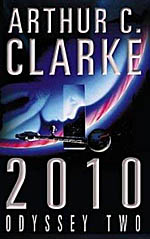
![]() ParallelWorlds
ParallelWorlds
3/11/2014
![]()
Intended Audience: Adult
Sexual content: None
>Ace/Genderqueer characters: yes (A.I. and possibly human)
Rating: PG
Writing style: 3/5
Likable characters: 2/5
Plot/Concepts: 3/5
Everyone's nervous about going back to Jupiter after what happened to the Discovery and David Bowman. But human curiosity cannot be stifled, and there is no way of finding out what happened without venturing forth to examine that strange obelisk, twin to the one found on Earth's moon.
I loved 2001: A Space Odyssey, mostly because of Hal, the Discovery's A.I., but also because Clarke has a way of unrepentantly asserting that the universe is entirely possible of containing things that might seem completely fantastical (and, sometimes, very much like drug-induced hallucinations). There is a fresh and unfettered perspective of the universe in the original book that I enjoyed. Unfortunately, there was not very much Hal in this book. What Hal existed (and David Bowman, too!) was subtly compelling in the way stories about robotic emotions often are, but sparse. The majority of the text was taken up with the voyage to Jupiter, and Heywood Floyd's relationship problems. These weren't dwelt on too repetitiously but I was disappointed at how little I felt a connection with the crew of the Leonov. In fact, I had a very difficult time telling any of them apart, despite vivid physical descriptions near the beginning of the story. I was not shown the force of their character, what really made them tick, and so their personalities fell flat.
The only human I felt much connection to (besides Bowman, who barely fits the qualification at this point), was Dr. Chandra, Hal's creator. Ironic, since he is depicted as very detached and aloof from the rest of the crew and perhaps from humanity in general. I keyed in to that subtlety in much the same way as I find robot personalities compelling. At the danger of playing into stereotypes, this may be part of why I see him as possibly an aromantic asexual, since he shows little interest in forming sexual or romantic attachments with other humans. When he did show emotion, I paid greater attention, and I found his isolation and concern for Hal much more interesting than the interactions of the rest of the crew.
I give the book points for including a homosexual character on the crew, without stereotyping or making any big fuss about it. It was apparently a commonly accepted fact among the other characters, barely worth mentioning except when relevant in terms of relationship dynamics. I also enjoy the mostly respectful international element between the Americans, Russians, and other nationalities on board (Dr. Chandra is from India). There is room for a lot of views of the universe in this book, depending on the reader's interpretation. It's weird, yes, and I'm not sure if there's a central message that Clarke is trying to tell (besides the universe being delightfully weird and surprising), but I especially liked the parts from Bowman's perspective as he roams the universe in a sort of personal adventure/errand.
The plot of this feels a bit less whole than in 2001, a little bit too much of just "this happened, and then this happened, isn't that totally bizarre and interesting?" so I am hopeful that, like many books in a series, what feels incomplete here will be answered or fulfilled in the next installment. Perhaps we will get more glimpses of the alternate forms of life introduced in this book, and what sort of culture they might produce. Bring it on!
http://www.parallelworldsmagazine.com/book-review-2010-odyssey-two-by-arthur-c-clarke/